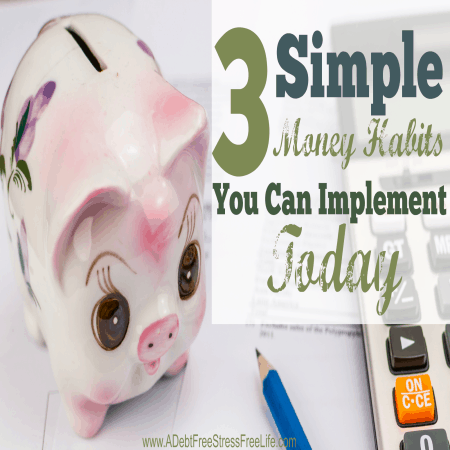A Mess Free Life may collect a share of sales or other compensation from the links on this page.
Creating simple money habits doesn’t have to be complicated or exhausting. It’s really easy when you understand what good money habits are and how to implement them into your life.
When I started gaining control over my finances, I quickly learned that I needed to establish better money habits.
My old habits didn’t serve me well, and so I engaged in activities that sabotaged my success. For example, when the bills came in, I typically would throw them into a basket and try to forget about them. As it turns out, I usually did forget about them until I was getting late or shut-off notices.
In the end, I ended up paying so much more in late fees, reinstatement fees and interest.
One day I finally woke up.
It was the day I got the letter from the mortgage company telling me they would be starting the foreclosure process.
In hindsight, I didn’t realize how long the process took and I’m glad I didn’t, because it would have hampered my growth. I thought I’d lose my home within a month or two, so I acted fast to change my situation.
Instead, I came out of the fog I was in and started doing something about my money problems. I implemented some great new habits and I’m sharing three of my best habits with you today so you too can change your financial situation:
1. Find A Permanent Home For Your Bills
When you have bills strewn about your home, office and car you are experiencing what I call money avoidance. This takes up valuable space and energy that would be better used in another way.
When you can’t find your bills you’re avoiding them. When you don’t open them, you’re avoiding them.
Next time a bill comes in, I want you to put it into a folder you create and label “bills to be paid.” This sounds very simple, and it is, but many people don’t have this simple system to help them.
Because of creating this folder and labeling it, you’ll now have one place where you put all of your bills that need to be paid. When the bills come in, put them in your folder.
By paying attention to bills in this way you clear the money clutter you’ve created, you’re handling your money in a positive way, and now can easily find your bills with little effort.
2. Schedule Bill Paying
Most people don’t pay their bills with any regularity. They pay them when they think they have the money or when they remember. If you’re avoiding paying your bills, you’re creating a whole lot of unnecessary drama.
Instead of all the drama and chaos, pick a day or days when you’ll pay your bills and mark this date on your calendar. Schedule it for the remainder of the year.
On that day(s) you’ve chosen, pull out that folder marked “Bills To Be Paid” and pay your bills. Each time a new bill comes in put it in your folder, so when the day comes to pay the bills they’ll be right there waiting for you.
3. Balance Your Checkbook Every Month
I remember before I came out of the fog and into the light I never balanced my checkbook. When I finally got around to doing it, I was so overwhelmed that I actually closed my accounts and opened new accounts so I could start with a clean slate.
I don’t suggest you do this, but if your checking account is really messed up, it might be something you want to consider. Closing my accounts also allowed me to ‘put to bed’ all the negativity associated with the old accounts.
Ultimately, you need to decide if that will work for you but, nonetheless, I do want you to balance your checking account every month.
Here’s what I recommend: Your statement will come to you at the same time each month. Figure out when you expect to get your statement in the mail and schedule an hour into your planner to balance your account. When the date arrives, go to QuickBooks or whatever method you use and balance your account.
Taking the time to engage in these good habits will ensure you get and stay on the path to financial wellness. Don’t delay in doing what you need to do to change your bad habits into good money habits.

